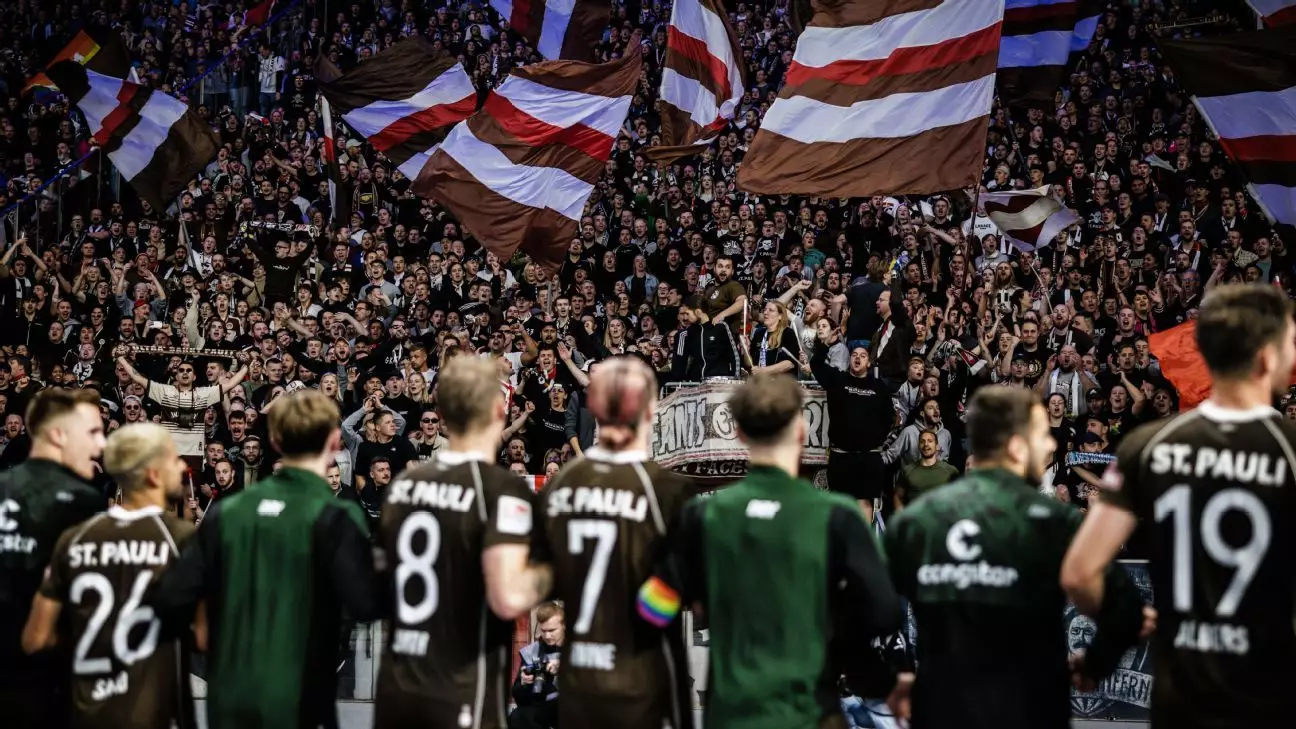In contemporary society, the boundaries between sports and political discourse often seem clearer and more rigid among some communities, particularly in the sport-cherishing cultures of the United States and the United Kingdom. However, Germany’s vibrant football culture defies this divide, showcasing how sports can serve as a platform for broader social issues. A prime example of this phenomenon resides in the storied history and community-driven philosophy of FC St. Pauli, a club that has turned its matches into spaces for social engagement and political expression.
St. Pauli, based in Hamburg, is not just a football club; it is an emblem of grassroots activism deeply intertwined with the cultural and political fabric of its local community. This relationship is woven into the very ethos of the club, which has openly declared its opposition to facism, racism, homophobia, and all forms of discrimination. Such views are not merely abstract principles; they resonate throughout the aesthetic of the club itself. The ubiquitous “Refugees Welcome” stickers and other social justice messages spotted throughout Hamburg reflect the club’s commitment to an inclusive community, aligning football fans’ identities with broader humanitarian concerns.
This unique marriage of football and activism has evolved over decades. Since its founding, St. Pauli has embraced its geographical roots in the neighborhood known for its historical subcultures, alternative music scenes, and progressive politics. Far from being a mere spectator sport, attending a match at the Millerntor Stadium represents an experience—a celebration of community, diversity, and mutual respect. During even the most thrilling moments on the pitch, fans demonstrate a united front, singing and chanting in unison while embodying principles that transcend football.
The club’s growth in the 1980s was marked by a profound shift toward social activism, driven by societal influences that informed a generation. This era gave birth to a vibrant fan culture that often countered the rampant hooliganism observed in European football, which had become increasingly associated with far-right ideologies. St. Pauli emerged as a stark contrast, illustrating that football fandom could channel positive energy toward social change.
A defining moment occurred in the 1990s when the club adopted the distinctive skull and crossbones emblem, a symbol that is now synonymous with St. Pauli worldwide. This was not merely a marketing gimmick but reflected a conscious decision to embrace and celebrate subcultural roots. The rowdy atmosphere at the Millerntor Stadium today echoes this ethos, where fans indulge in raucous musical tributes ranging from classic rock anthems to contemporary hits, creating a palpable sense of unity and belonging.
However, St. Pauli’s recent challenges in the Bundesliga have proven to be another test of its philosophy and strength. The team’s financial disparity, reflected in its wage budget being substantially lower than that of powerhouse clubs like Bayern Munich, speaks volumes about the economic inequities present in modern football. Yet, it is this underdog status that has further endeared St. Pauli to a global audience. The community resilience, character, and tenacity of the Kiezkicker—often fielding players who share their commitment to social issues—highlight a narrative that transcends mere sporting competition.
In an era where corporate interests tend to overshadow the spirit of community across many football clubs, St. Pauli is taking unprecedented steps through initiatives like the Genossenschaftsmodell, a cooperative model that allows fans to buy shares without gaining inequitable voting power. This innovative approach to club ownership seeks to empower the very supporters who comprise its vibrant community. It reflects a commitment to inclusivity in decision-making, ensuring that all voices are heard equally, irrespective of wealth—a stark counterpoint to the trends seen in many top-tier leagues.
By fostering a “one person, one vote” philosophy, St. Pauli emphasizes the importance of community over capital. The hope is that this model will instill a greater sense of responsibility among all stakeholders involved, from fans to players, creating a genuine connection that enriches the club.
St. Pauli’s president, Oke Göttlich, exemplifies the club’s ethos through his grassroots approach and willingness to engage publicly on various civic issues. Under his guidance, the club continues to champion a vision that resonates not only with local supporters but with a global audience keen on seeing sport as a medium for positive social change.
As St. Pauli prepares to face powerful opponents in the Bundesliga, its unique blend of sports and politics serves as a beacon in an often-commercialized world. This football club exemplifies how community spirit and socio-political activism can coalesce with the love of the game, creating an atmosphere that extends far beyond the achievements on the pitch. With each whistle blown at the Millerntor, St. Pauli stands as a testament to the belief that football can be a force for community engagement, equality, and justice, urging others in the sports world to reconsider the boundaries traditionally imposed upon the beautiful game.

Leave a Reply